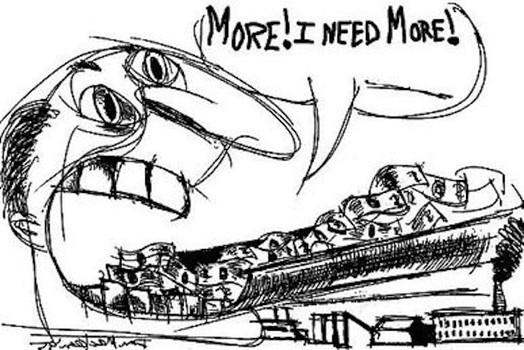Everyone we know walks around unsatisfied. There is much in life to enjoy, celebrate, praise and wrap our arms around as good. But, it isn’t enough for us. In fact, precisely in those moments of our lives when we are most happy – times of utter bliss, sheer ecstasy – we realize, in our heart of hearts, that it all still points to ‘something more.’ Something we have never before met, seen or possessed. We desire something that we can only describe as, ‘We-know-not-what.’ The Germans even have a word for this primordial hunger: Sehnsucht. No one describes this more beautifully than C.S. Lewis:
That unnameable something, desire for which pierces us like a rapier at the smell of bonfire, the sound of wild ducks flying overhead, the title of The Well at the World’s End, the opening lines of “Kubla Khan”, the morning cobwebs in late summer, or the noise of falling waves. (Pilgrim’s Regress)
In a similar vein, St. Augustine proclaims, almost scandalously (as was his way):
When you have learned that you are immortal – will that be enough for you? …It will be something great; but it is too little for me. (Soliloquia II)
If this desire for we-know-not-what shows us anything, it probably most emphatically clarifies that this is not our ultimate home.
If I find in myself a desire which no experience in this world can satisfy, the most probable explanation is that I was made for another world. (C.S. Lewis, Mere Christianity)
This is what it means to be human; this is how we have to understand ourselves. But, there is a stiff gust within the spirit of the age that runs directly contrary to this. At first, it is quite appealing and seductive. It has many faces, some which seem quite harmless, but, like termites in the floorboards, it leads to corruption and destruction. It is a skeleton’s face hidden behind a bejeweled veil. Worst of all, it is a foundational pillar of our culture and society – plaguing the West and exported all over the globe. This is the rot of consumerism.
All of us experience the sad effects of blind submission to consumerism. In the first place it represents crass materialism. At the same time it represents a radical dissatisfaction because one quickly – unless one is shielded from the flood of publicity and the ceaseless and tempting offers of products – learns that the more one possesses, the more one wants, while deeper aspirations remain unsatisfied and perhaps even stifled. (St. John Paul II, Sollicitudo Rei Socialis)
Consumerism assumes that we can be fulfilled through stuff. And not just physical stuff, but immaterial stuff too. We all know it peddles unlimited clothes, shoes, jewelry, cars, houses, magazines, food and drinks. But, it also bombards us with more TV shows, music options, globs of information, news, entertainment, and technological ‘conveniences.’ Stuff, ‘experience’ and entertainment without limits. Alas, it doesn’t satisfy; it only masks and enflames the hunger. We hunger for real food, but it offers us calorie-free candy instead. In the throes of consumerism, ironically, we consume basically nothing and so we starve.
It is not wrong to want to live better, but “what is wrong is a style of life which is presumed to be better when it is directed towards ‘having rather than ‘being’” (St. John Paul II, Centesimus Annus). As such, consumerism is founded upon a lie that “wrongly [convinces the person] that he is the sole author of himself, his life and society” (Pope Benedict XVI, Caritas in Veritate) and so inherently produces soul-crushing absurdities:
I was part of that strange race of people aptly described as spending their lives doing things they detest, to make money they don’t want, to buy things they don’t need, to impress people they don’t like. (Emile Gauvreau)
No doubt most spiritually oriented persons have all felt the emptiness of consumerism. Such people might even look at it and say, “Yeah, that is not helpful.” But, do we really live free from its grasp? Despite all our head-knowledge about “how bad it is” – admit it – consumerism (living in this country, especially) is probably the biggest tranquilizer dart sticking out of our necks – it numbs us, saps our energy and covers up our deepest desires. And it can even make us approach a spiritual life also as ‘consumers’ – greedily and anxiously pursuing ‘spiritual insight’ and a ‘religiosity’ that is bent on having ‘spiritual goods’ (see The Fulfillment of All Desire).
We ought to heartily investigate our lives to see where we are still held captive by this ferocious beast. Let’s put ourselves to the test which St. Francis de Sales gives:
If you find your heart very desolated and afflicted at the loss of property [or, nowadays, those immaterial, cyberspace comforts], believe me, you love it too much. The strongest proof of love for a lost object is suffering over its loss. (Introduction to the Devout Life)
Yikes.
This is a battle for our love, for our heart. The words of Jesus should blow through the veil and get down to the core of the matter: “What do you seek?” (John 1:38); “You cannot serve (i.e. love) God and mammon” (Matt. 6:24). Why don’t we clear away the crud, unearth the deep wells of desire within us and go straight for the real thing? Why do we give our hearts to lesser things and feebly shrug our shoulders at the heights we are meant to climb?
We are half-hearted creatures, fooling about with drink and sex and ambition when infinite joy is offered us, like an ignorant child who wants to go on making mud pies in a slum because he cannot imagine what is meant by the offer of a holiday at the sea. We are far too easily pleased. (C.S. Lewis, The Weight of Glory)
We are offered uncompromising adventure, limitless happiness, the kiss of God, a lived relationship with He whom we ache to know. In short, we are offered the very ‘we-know-not-what’ that nearly pulls our hearts out of our chests. Why would we want to settle?
If then you have been raised with Christ, seek the things that are above, where Christ is, seated at the right hand of God. Set your minds on things that are above, not on things that are on earth. For you have died, and your life is hid with Christ in God. When Christ who is our life appears, then you also will appear with him in glory. (Col. 3:1-4)
The Apostles and the early disciples really got this, didn’t they? Think about it: they had no possessions! They took to heart Paul’s words to “deal with the world as though they had no dealings with it” (1 Cor. 7:31) and to count all earthly stuff (comforts, success, etc.) as skubala: that’s a strong Greek word literally meaning sh** (Phil. 3:8). Why do we try to live on skubala, when it’s real food we desire? Following their example, why don’t we drop what little nothings we cling to and joyously fix our eyes on “the glory to be revealed” (Rom. 8:18)?
For a disciple of Jesus it comes down to this: is that deep desire for ‘something more’ being daily consumed – maybe nearly extinguished – by what can never satisfy? Or are we increasingly lit up each day by a consuming desire that longs for the Lord and longs for everyone we know to know Him.
When honestly looking at our days, can we say that it is steered and oriented by a desire for God and His Kingdom? Jesus stands at the door, with a beckoning smile, and He knocks…
Joey McCoy
Latest posts by Joey McCoy (see all)
- Anxiety and The Downward Spiral - October 15, 2015
- Remember… - October 8, 2015
- Yes, You Would - October 1, 2015





 Copyright 2014 by
Copyright 2014 by